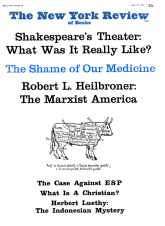In response to:
Where Do We Go From Here? from the March 17, 1966 issue
To the Editors:
At intervals over the past three years Robert Heilbroner has adjusted his economic lenses and scanned the horizon for signs of the Guaranteed Income. In 1963 he pronounced it a mirage (“…Theobald now produces with a flourish his Magic Rejuvenation Pill…a divertissement, an intellectual bagatelle, a cute idea…”). Nevertheless, shortly after, we find him joining a welcoming committee (The Triple Revolution).
Always of interest in Heilbroner’s reviews is the customarily full and clear statement of his latest position on this issue. Unfortunately, this is not so with his most recent exposition, “Where do we go from here?” (March 17). In his attempt to place himself in opposition to each of a pair of contradictory positions he does not find firm middle ground between them; rather he straddles two views. Having reiterated the at least five-year-old statement that “there is still an upper limit on employment…due to the prospect of a ceiling on the total demand…” and having admitted that “In the long run…I would have no objection to the guaranteed income,” he then adds, “But the long run is still a long way off.”
Come now, Dr. Heilbroner, a little “nerve,” make up your mind. You can’t join both the let’s prepare and the wait-and-see schools of thought. Now that your earlier estimate of the political infeasibility of the Guaranteed Income proposal has been contradicted by events, do not fall back on the delaying tactic of suggesting we await fuller information about the interaction of technology with the market economy. Today’s more participant population will not passively await reorganization, but will actively re-structure their own lives and their society. Increased political awareness goes hand-in-hand with increased socioeconomic awareness and educational rethinking. Today’s tot in “Head Start” will go to college in a physical and socioeconomic environment so changed as to be startling even to contemporary radicals. Or perhaps I should say especially to some of today’s radicals; for an educational system freed from the need to produce stereotyped units for an industrial-age economy will give a new meaning to the concept of “free enterprise” and challenge the continuing drift toward overcentralized control.
Robert Theobald
New York City
This Issue
May 26, 1966



